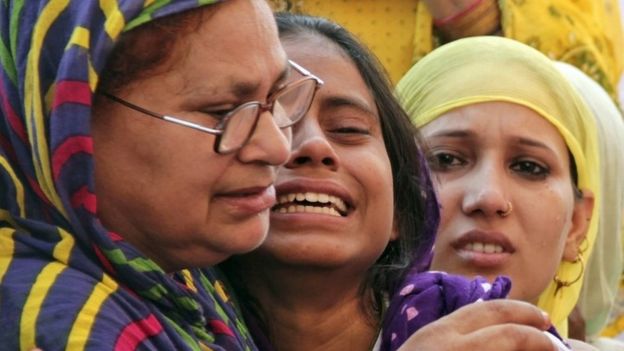
Srinagar — Union Home Minister Rajnath Singh Sept. 5 hit out at Kashmiri separatist leaders who refused to talk to some MPs from an all-party team, saying their conduct defied the spirit of “Kashmiriyat.”
The home minister, however, made it clear that MPs Sharad Yadav, Sitaram Yechury, D. Raja, Jay Prakash Narayan and Assaduddin Owaisi went to meet the separatist leaders in their individual capacity and not as part of the all-party delegation that was on a two-day trip to Jammu and Kashmir.
“Some members of the delegation went to meet Hurriyat leaders. We had neither said ‘no’ nor ‘yes’ to their meetings. You know what happened. They had gone there in their individual capacity,” he told reporters here before flying to Jammu.
He was referring to the attempt by the national opposition leaders from the delegation to hold talks with top Kashmiri separatists on Sept.4.
While other separatist leaders did meet them briefly but refused to hold talks, hardliner Syed Ali Shah Geelani shut his door on the MPs even as they kept waiting outside his upscale Hyderpora residence for about 10 minutes.
This, Rajnath Singh said, “was certainly neither ‘Kashmiriyat’ nor ‘insaniyat’ (humane).
“If you do not want to talk is a different thing. But what they did proves they have no faith in democracy.”
The all-party delegation arrived here Sept. 4, nearly two months after a bloody unrest erupted in the aftermath of the July 8 killing of Hizbul Mujahideen commander Burhan Wani.
At least 74 persons have been killed and over 12,000 injured in the weeks of the turmoil, the deadliest Kashmir has seen in six years.
As the delegation left for Jammu, the Kashmir Valley continued to be tense amid curfew in some parts, shutdown and recurring anti-government and pro-freedom protests.
Rajnath Singh said the government had left its options open for talks with anyone within the ambit of “Kashmiriyat, jamhooriyat and insaniyat.” But he made it clear that there were no two ways about the fact “that Jammu and Kashmir was, is and will remain an integral part of India.”
Visibly disappointed, the minister hinted that any chance of talks with the separatists in the near future was impossible.
He also dismissed any possibility of an India-Pakistan dialogue over Kashmir, rejecting a key demand of separatist leaders.
“Everybody in Kashmir wants peace and normalcy to return. I am hopeful that the situation in Jammu and Kashmir will improve,” he said after meeting some “300 people including students, teachers, traders” during the delegation’s nearly 30-hour stay in the valley.
Chief Minister Mehbooba Mufti’s government and the Peoples Democratic Party also retained hopes for peace and a dialogue process to engage all stakeholders, including separatist leaders.
“Dialogue and engagement is a continuous process. It can’t be expected to happen (by rubbing) a magic lamp,” senior PDP leader and Education Minister Naeem Akhtar told reporters.
Yechury, who faced a snub from Geelani on Sept. 4, said he had not given up on the mission to bring peace in Kashmir.
AP adds from New Delhi: Indian government troops will begin using some chili-filled shells instead of shotgun pellets to control angry crowds in the Indian-administered portion of Kashmir, Home Minister Rajnath Singh said Sept.5.
Singh was in Srinagar with a group of federal lawmakers to try to break the latest cycle of violence hitting the region.
According to local officials and doctors, the use of pellet guns has killed at least four people and left more than 100 partially or completely blind.
The new chili-filled shells are said to severely irritate and temporarily immobilize their targets.
Singh said the government had asked experts to suggest replacements for the pellet guns and their recommendation was PAVA shells, which are filled with the same compound found in chili peppers.
“I understand that no one will lose their life due to the use of PAVA,” Singh said.




Be the first to comment